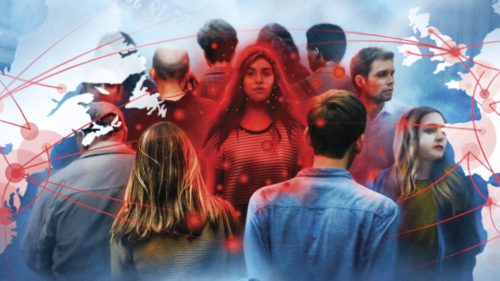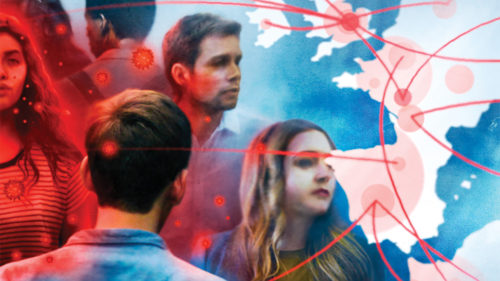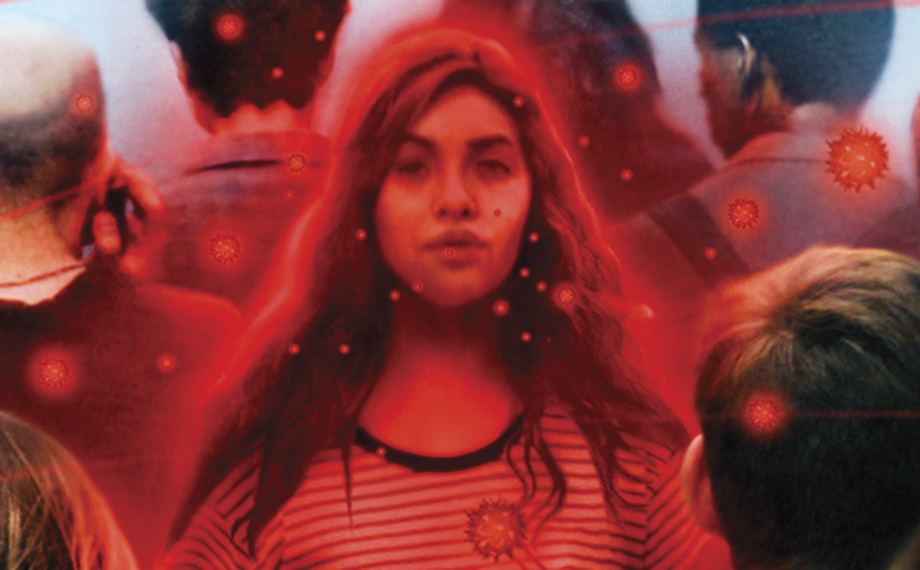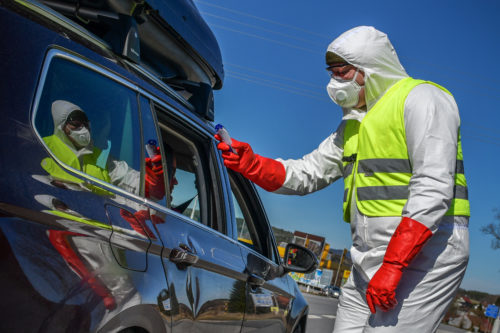latest
Fictions: Infectious
Infectious
Read the fourth instalment in our Fictions series.
Text by Liz Williams, artwork by Vincent Chong.
Fictions: Health and Care Re-Imagined presents world-class fiction to inspire debate and new thinking among practitioners and policy-makers. To find out about the project, the authors and to read other stories in the collection, click here.
Read the associated “Getting Real” blog, exploring the technology, science, policy, and societal implications of the themes from the story here.
Infectious
Liz Williams
I knew I was ill the moment I got on the plane. I travel well, usually. But this time I began to feel dizzy as I browsed the selection of cosmetics deep into duty free: the ASMR-delivery body creams, the gum glow treatments, the nape highlighters. As I looked, product marketing followed me home, sliding down the long soft front of my coat and lodging deep within the fabric, to be uploaded later should I so choose (I pay a lot for my filters but some of it’s useful). As I reached out to the virtual tester, my hand began to shake, just a fraction, and I thought: Thank God.
If my temperature had risen before we went through the scanners, they would have refused me permission to board. I said as much to Wayim. But that was why I’d invested properly.
“Oh really? How are you feeling now? What’s your temperature?”
Together we peered at my wristband monitor. All nice and normal. I’d spent a lot on the device and it would get us ahead of the queue and first onto the plane, logging my data safely onto the on-board scanners.
“Well, that’s good,” said Wayim. “Fancy a drink? Alcohol doesn’t count in an airport. Neither do calories.”
He must have seen the look on my face, because he added quickly, “I don’t mean one of the ordinary bars. First class only. The members’ bar.”
“I suppose.”
By the time we entered the shute for boarding, I was feeling shaky and fuzzy, but my wrist monitor was still reading normal, so the steward merely ushered me onto the plane with a smile. We had booked into first class, obviously. The flight, via the Penang-Heathrow air bridge up and over the Kármán line, would not take too long, but no matter what the levels of entertainment, I find flights boring.
But then, I find most things boring.
I dozed for most of the flight, anyway. Whatever bug I’d picked up, it was making me very tired. Wayim watched a film and kept laughing, which was irritating. Eventually I asked him if he could be quieter. I was sure it was annoying other people, too. And he did shut up; he was quiet after that. I looked out of the window once, but all I could see was the Earth’s blue-pearl curve below, so I snapped the shade shut again.
We landed in baking heat. I know this because the pilot told us so and also because it hit me as we stepped out of the plane. We went through a spray as we got onto the bus and then another going into the terminal itself. I have an exemption pass for this because of allergies but this time I didn’t bother to display it, just took the chemicals. It would speed things up going through the quarantine channel. I didn’t want too close an investigation, you see. Just in case.
My wrist monitor gave them the results they wanted but as luck would have it I got pulled in the Q-chan. It’s random, I know that, though some people get paranoid about it, say they always get hauled into the quarantine channel. I left Wayim standing by the gate while I answered their questions.
Did I understand the need for quarantine?
Yes, I did.
Who was my travel partner? Did we live together? Did I think he understood the need for quarantine?
Wayim Rehman. Yes, he understood it completely, and I explained why.
Ah, yes. He will have total comprehension, then – and the man laughed at his little joke. I laughed, too, as if charmed by his wit.
Had I had an infectious disease, on the official list of notifiable diseases?
No, I lied.
Did I undertake to isolate for a two-week span of time?
Yes. I answered with downcast eyes, a little timid, sometimes glancing up, however, to imbue my words with sincerity. The official was completely satisfied.
“I’m terribly worried about getting sick,” I murmured. “Or even worse. Imagine – infecting others. What an awful thought. We all have to be so careful. It’s our social duty, isn’t it? It’s just what decent people do.”
He gave an approving nod and released me into the wild.
That night, we went clubbing.
You will know, of course, that it is against the law these days, but as the old US of A found during Prohibition, there are always ways and means. Here in London, though, there is only one choice: the club called the Membrane. That’s not its real name. Nor shall I tell you where it is to be found, which district, or how to get there. We walk, as one does in the city. Perhaps it is an old Tube station, long shut down. Perhaps it is a former car park, running beneath the wedding-cake buildings of Kensington or Chelsea. Perhaps it is none of these things. It takes a long time to be trusted enough with its secret. And it has never been betrayed. At least, not yet.
That night, I found the walk hard. I was shivery by then, and the October heat didn’t help. By the time we reached the little door, at the back of a building which is the entrance to the Membrane, I was drenched.
“Wait,” I told Wayim. “Hold my parasol.” I sprayed myself, wriggled out of my top and conjured another one from the tiny compostable tube in my bag. Onlookers from above, a drone or spy-eye, would see nothing except the parasol’s dome as I refreshed my makeup.
“Finished? You look cooler.”
And then we went inside.
The girl on the door checked my monitor.
“All very nice,” she said.
I smiled. Little did she know.
“I need a drink,” I told Wayim and obediently he ventured to the bar as I arranged myself on a nearby chaise longue and considered who might be here tonight. It was a Sunday, the biggest night of the week: no-one was here who might have to do anything as crass as start work on Monday mornings. We were neither early nor late, and there were small groups of people dotted against the curving tiled walls. Soon, when things hotted up, most people would move onto the dancefloor or the crush bar next door. Against government regulations, of course, but isn’t that the whole point?
And if they knew they were really running a risk? That it wasn’t just a game of let’s pretend? Maybe they did. I mustn’t be too condescending.
There was a new group in tonight, a gaggle of girls. They all wore the latest in skintones and they also all wore butterfly sandals, in silver and gold and pink. Only one of the sets of sandals was genuine Eschada; the rest were knock-offs, but good ones. The girl who wore the real pair was vaguely familiar: tall, very thin, with a lot of facial modifications, subtle and in good taste. I amused myself for a minute estimating how much she had paid for them and when Wayim returned with our drinks I asked him if he knew who she was.
“Yeah, I think I’ve seen her before. Hang on.”
He tapped his phone, then shook his head.
“No. She’s got a block on.”
“But you’ve got Readout.”
“It’s blocking that, too.”
I was impressed. That must have cost a lot. Unless she was – well. Maybe not think too closely about that, because if she was with the authorities, she wouldn’t take too kindly to being scanned.
But if she was with the authorities, I’d be unlikely to recognise her in the first place.
At this point someone we both knew, a young woman named Floa, came to sit with us, so I asked her if she knew who the girl was.
“Yes, sure, it’s Miri Placet. She’s never been in here before; it’s a psych to see her.”
“The glide-star?” Wayim said, impressed.
“That’s the one.”
I sniffed. I don’t do glide; if I want to have an experience, I’ll have it myself, not vicariously, through someone else’s carefully manufactured dreams. But jealousy’s not a good look.
“She’s very lovely,” I murmured. Floa smiled at me.
“You’re so sweet, Geramin.”
I took a sip of my drink and it made me cough. Once I’d started, I couldn’t seem to stop. I coughed and coughed, until the glide-star’s party turned and looked at me.
“Sorry,” I spluttered. “Not feeling very well.”
“Ooh,” I heard Miri Placet say. “Do you suppose it’s infectious?”
“Are you really not feeling well, Geramin?” Floa said with concern.
“No, I’m not. Something I picked up in Bali, I think.” I made sure I spoke loudly enough to be overheard.
And there was respect in Floa’s voice as she said, “Oh wow. You’re so lucky.”
*

Next day, I felt worse. Physically, at least. Emotionally? Well, it was kicking in now and that was good.
I’ve done this before, obviously. Three times: once with a respiratory, but non-SARS derivative; once with an echovirus which was really tough but I just loved the name; and once with a picornavirus developed in United Korea that laid me out for a week, but it was totally worth it to let my voice drop as I said, “And then I was completely paralysed” and see the shock in people’s faces.
“But weren’t you scared? Did you – is there a cure?”
As I nodded bravely. “There is, but it doesn’t always work.”
That’s the risk you take, though, when you’re an artist, like me.
This time, I was in bed when the assistant told me that someone was at the door.
“Who is it, Tyra?”
The neutral electronic voice purred, “Her name is Miri Placet.”
“Indeed!”
I was ready to receive visitors, even though I felt terrible. I’d done my hair and my makeup, was wearing a sensaround information wrap which I knew looked good. Wayim had been waiting on me hand and foot; he’s so helpful whenever I’m ill.
There are stiff penalties for no-consent distancing violations but Miri didn’t pay any attention to those. When Wayim showed her upstairs, she ran straight to my bedside and knelt down. I pulled away, snatching my mask from the bedside stand and whisking it over my face.
“It’s all right,” she said, quickly. “I’m not trying to – you know.”
“Get infected?”
Miri got to her feet and sat down in a nearby chair.
“I meant, I’m not trying to steal it from you.”
I laughed. “I paid a lot of money to be as sick as this, but it’s cool. Just as long as you mind your manners.”
“Is it, though, you know, infectious?”
I gave her what I hoped was a mysterious smile, but said, with some regret, “No. It won’t be. Well, that’s what they said.”
“Ohhh,” she breathed. She really was very lovely. The designs on the summerweight slicks that she wore chased up and down her long legs, feeding information to and fro. “It might be an undecided, then?”
“There’s always a chance. Fingers crossed.”
“It must have cost a fortune.”
I shrugged. “I have the money. And it’s worth it. Why did you come to see me?”
She looked me straight in the eye. I could see the glide behind her eyes, but it was cataract creamy, a milky blue. I knew that meant that she’d switched it off for our interview and you know, being arrested might be interesting, but I didn’t really want that experience.
“I’m bored,” she said. “I – you know what I do. I’ve done all sorts of things and I’m still bored. There’s no real danger any more, no real risk. This is the first generation that’s happened to. Even fifty years ago you could still have been knocked down by a car.”
“That can still happen.”
She pulled a face. “Only if the algorithm fucks up or some terrorist hacks it. And how often does that happen? Not a whole lot.”
“You know, we could still have a pandemic on this planet.”
“We could, but with all the money going into healthcare, we won’t, will we? Now no-one’s got an army any more and all their GDP’s being put into research and infectious disease solutions, I don’t expect to see one. And I’m so bored with being in tip-top condition all the time – yeah, I know, my viewers expect it. My insurers spend a mint on my physical condition. I’ve never known what it is to be ill. I’ve never known what it’s like to be – exposed.”
I’d worked that out, otherwise she wouldn’t have been clubbing. She’d get off on the transgression, even if she knew there was no real risk.
“Until you walked in through my door,” I said.
“It’s a real disease, though, what you’ve got? It’s not a synthetic? Because I know people who buy those, right, but it’s not real, is it? You don’t get the real emotions with it.”
“Synthetics are a game. And I don’t play games.”
“Yeah, that’s what I thought. It’s what everyone says about you. Well, a few people, anyway. Lots of rumours but who ever knows about those?”
”Not many people know for sure,” I said, but I was gratified all the same. Wayim keeps his ear to the ground but I’m not sure he doesn’t tell me just what I want to hear. Perhaps I should reprogram him.
She was looking at me expectantly and I knew what she wanted but I don’t believe in giving anyone what they want straight away. It’s not good for the character. I knew Wayim was listening, naughty boy, so I let my head loll to the side and closed my eyes.
“I’m not feeling too well,” I murmured and immediately he was in through the door.
“…sure you understand, perhaps another day, wouldn’t quite do…”
And of course she was all anxiety, flustered, apologised. I told her to come back the following week.
Perhaps I’d be over it by then. Or perhaps not.
Later, I woke, completely disoriented. Wayim was bending over me, his smooth face a little crumpled with concern.
“Where…” I croaked. I felt terrible; he had to help me to the bathroom, but since I’d eaten nothing for days, I could not throw up. Left to my own devices I would have remained curled up on the bathroom floor but Wayim picked me up once I’d finished retching and carried me back to bed. The sheets had changed themselves in the interim and the room refreshers had circuited; it was pleasantly cool and smelled of lavender.
Infectious. That was my next ambition, once I’d recovered from this virus. No darklab will sell you an infectious illness, they’ll tell you they’re all NCDs. There are labs that will, but I haven’t got to those yet: there was one, in Irkutsk, but the authorities closed it down before I could make contact, burned it to the ground with the researchers inside it, too.
I said all this to Wayim, delirious, ranting. At some point I remember he said, “Some people have an ideological view of all this, of course. I have been studying it. They say it’s human destiny to get sick and die. That if we do not get ill, we will not learn.”
I reached up and touched his smooth plastic skin with my hot hand.
“Something you can never experience, my friend.”
“Something I never can.” I could not tell if there was regret in his artificial voice or not.
“You know me, Wayim. We’ve been together a long time, ever since I bought you and you were delivered to my door. You know I’m not political. I’m an artist, that’s all. An artist of the flesh.”
“I know.” His voice was gentle and full of love but then he was engineered that way. I didn’t mind.
Some time later, I don’t know when, he came to tell me with grave neutrality that Miri Placet had fallen sick and so had some of her friends, some of the people who went to the Membrane, and the authorities were looking for me. I’ve paid a lot of money to hide contact tracing, but I suspected it was only a matter of time. Wayim knew what to do: we’d rehearsed this scenario. I’d love to be in hospital but I didn’t fancy prison. And I wanted death to be on my own terms. That night he carried me downstairs, put me in the car, and we drove north. There’s a place, but I won’t tell you where. It’s a long way from London and not on land. There, beneath the waves, were others like me and when I was lifted through the airlock and into the bunker, I was welcomed as a heroine. The delirium had passed but I didn’t know how long I had.
“Well done,” Doctor Dove said. Such a lovely name, like a bird you hold in your hands that won’t mind if you wring its neck. “You’ve set a city on fire. New epidemic, no cure, kills young people. Quite messy, really. Mind letting me know where you got it?”
“Bali.”
“Oh, I have an idea. There are several. Was it the Hua Quai? they’re making quite a name for themselves. Did they tell you it wasn’t infectious?”
“Yes.”
“Either they lied or the virus has.”
“I was looking for a darklab,” I told her.
“Well,” she said, laughing. “I think you found one.”
A superspreader. I had achieved my life’s ambition, my art’s work, and all by accident, too. I did not like to think that the lab had cheated me, but I loved the thought that the virus itself perhaps had mutated. Miri Placet and her friends had been my canvas, all unwitting, apprentices or fakes, and I the original. But I was glad she’d got what she wanted, after all. I wondered whether it still was what she wanted. If she was still even alive.
Wayim would remain with me; I’d asked Doctor Dove to switch off his loyalty algorithms, after a suitable period of mourning, then go back out into the world and take my secrets with him. But for the time I had left, I lay and looked through the screen which showed me the outside world, beneath the sea, the nothing, the endless, endless black.




